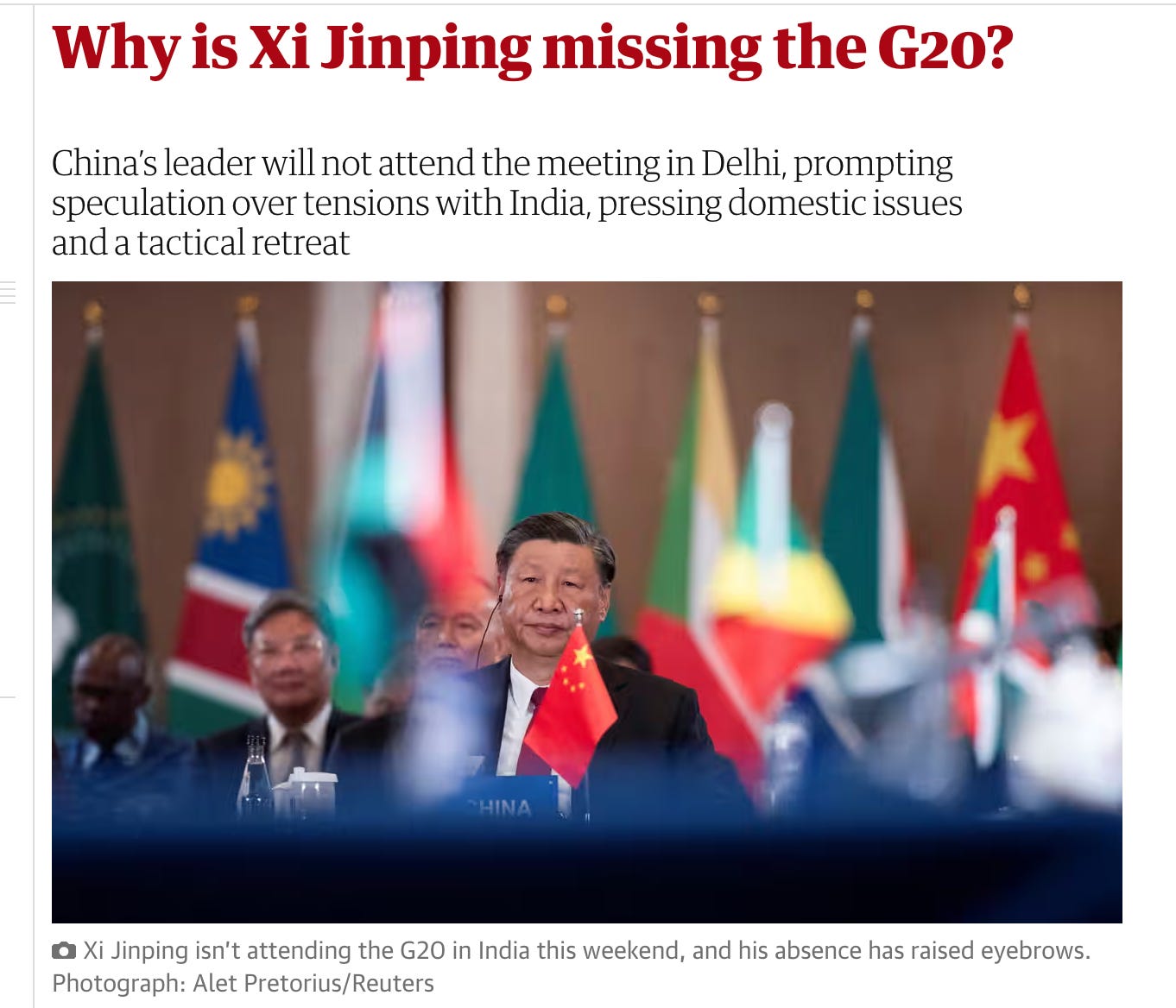Welcome to the 180th edition of Trade War.
Xi Jinping snubs the G-20. Derisking vs. decoupling: why Beijing doesn’t buy the distinction. And Commerce Secretary Gina Raimondo warns China could become “uninvestable” after her recent trip to the country.
Beijing bars central government officials from using Apple iPhones. Huawei smartphone shows indigenous chip breakthrough. And a new department is set up to help struggling Chinese private enterprises.
Latest numbers show the service economy is weakening. And China’s swelling debt could lead to a financial crisis, warns expert.
Two Takes
“As it has for many years, China remains a most important engine of global growth” - Xie Feng, Chinese ambassador to the United States
“[China’s] return as a powerful driver of global economic growth is unlikely in the near future” - Mohamed El-Erian, president of Queens’ College, Cambridge
Why did Xi skip the G-20 summit?
What’s behind Xi Jinping’s decision to skip the G-20 meeting in New Delhi, India?
That’s the question a lot of people have been asking. Before this year, China’s top leader has attended every G-20 since he took power in 2013.
“Just a year ago, Xi was urging governments to strengthen cooperation in multilateral organisations, including specifically the G-20,” reports The Guardian’s Helen Davidson.
“But as he grows frustrated with partnerships like Aukus and the Quad, which—along with the G-20—are pushing back on China’s military expansion and Beijing’s relationship with Russia, he has sought to elevate groups like BRICs which he sees as more focused on the global south and less dominated by the west,” Davidson adds.
“Beijing may see limited use in the G-20 for pushing Chinese narratives or that they don’t need to invest as much . . . because they have other multilateral platforms through which China can exert greater influence and control the agenda and outcome—for instance, in the Shanghai Cooperation Organization and BRICs,” says the International Crisis Group’s Amanda Hsiao.
“One suspects that keeping everyone else guessing as to why Xi is absent from a multilateral forum is part of the new Chinese playbook,” says King’s College London professor Alessio Patalano. “Xi has seemingly decided there’s an advantage in making it harder for others to read what his next move will be.”
Here is the full text (pdf) of the G-20 New Delhi Leaders Declaration.
Derisking vs. decoupling?
Following the recent trip to China by Commerce Secretary Gina Raimondo, I try to parse the difference between derisking and decoupling from a U.S. perspective, and explain why China thinks it’s all just word games.
Listen to the full 35-minute conversation in which I discuss this and much more in U.S.-China political and economic relations, with Jim Herlihy on the The San Francisco Experience podcast.
Raimondo: China risks becoming ‘uninvestable’
Commerce Secretary Raimondo was asked on CBS News "Face the Nation,” to explain what she meant when she warned Chinese officials that their country risked becoming “uninvestable.”
“One of the complaints I hear frequently from U.S. business, by the way, business who are used to doing business in—in difficult parts of the world. They say . . . China's regulations are not at all transparent. You know, they'll raid a business in March and not explain what went on for many months. They will arrest folks but not provide due process or tell you what happened,” Raimondo explained.
“It's in their economic interest to have foreign direct investment and to make sure . . . they had a very good economy, [which is] market-oriented and reform-minded. And so we have to hope that self interest will affect their future decisions.”
“When China was more market-oriented, open . . . [and] a little bit more transparent, their economy did very well. And more recently, as they have closed down and become more arbitrary in the way they administer regulations, the economy is quite challenged,” Raimondo said.
Not sure that is the correct progression—that China becoming more arbitrary with regulations and less transparent came first, and that then led to a weaker economy, as Raimondo suggests.
I think it’s the other way around: the economy has been doing very badly for a long while, and Beijing’s inability to turn it around has badly spooked China’s leaders, making them begin to worry about their longterm ability to rule unchallenged.
That fear plus the default tendency of Xi to always opt for more control explains the increasing closing down, the arbitrary regulations, and overall, the politicization of the economy. The more worried the leadership has become about the direction of the economy, and their inability to turn it around, the more they try to control it and end up further damaging it.
Here is the full transcript of Raimondo’s interview on CBS “Face the Nation.”
Beijing bans gov’t from using Apple iPhones
The latest company to become victim of China’s shifting regulations: Apple.
Keep reading with a 7-day free trial
Subscribe to Trade War to keep reading this post and get 7 days of free access to the full post archives.



